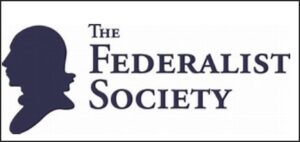 by James A. Bacon
by James A. Bacon
Three days ago the National Lawyers Guild at UVa condemned the invitation of Erin Hawley, senior counsel for the Alliance Defending Freedom, to a Federalist Society event previewing a U.S. Supreme Court case touching upon religious freedom. The “progressive” law student group cited the Southern Poverty Law Center designation of the Alliance as an anti-LGBTQ+ “hate” group.
The Federalist Society, a group of mostly conservative and libertarian law school students, invited Hawley to a discussion of 303 Creative LLC v. Elenis, a pending Supreme Court case. The Alliance Defending Freedom represents the plaintiff in that case, Lorie Smith, who believes on religious grounds that marriage should be between a man and a woman, and refuses to design websites for LGBTQ+ couples.
The National Lawyers Guild (NGL) at UVa “condemns the views of the Alliance Defending Freedom (ADF) as well as the Federalist Society’s decision to give them a platform by inviting them to speak at an event at the law school,” stated the NGL Facebook page in a post that garnered 88 “likes.”
(In the aftermath of the triple-murder shooting at the University of Virginia Sunday night, the Federalist Society canceled the Tuesday meeting “out of respect for the tragedy,” said Julia Jeanette Mroz, president of the UVa chapter. “As a student group, we felt it appropriate to follow the University’s lead in designating today a Day of Observance. No other circumstances bore on this decision.”
(The Society is working with Hawley to reschedule the event this spring.)
ADF, asserted the statement, promotes “offensive and harmful” notions such as the idea that LGBTQ+ people are more likely to engage in pedophilia; that the “homosexual agenda” will destroy Christianity and society; and that sexual acts between consenting adults should be criminalized.
Chris Schandevel, senior counsel on ADF’s Appellate Advocacy Team and 2012 Law alumnus, told The Cavalier Daily that the event is meant to encourage the free exchange of ideas and find common ground. “We believe that our universities really are meant to be a marketplace for ideas, so we are just fundamentally committed to showing up, engaging, having conversations, talking about the issues, that are what we see as some of the most important issues for us as a society.”
“Are we going to try to be a society that requires people to either give up their beliefs or conform their beliefs to be more aligned with everyone else’s?” Schandevel said.
But Sabrina Surgil, a second-year law student and chair of the Lambda Law Alliance, said the invitation could make LGBTQ+ people feel unsafe.
“I don’t know how LGBTQ+ students at U.Va. Law are expected to just do their work and go to class and participate and be able to engage with the curriculum in the same way that straight students are when people who are trying to erase and criminalize our entire existence are allowed the space to speak and to be normalized on such a scale at the school,” she said.
“[LGBTQ+ students] deserve to feel safe at school and we deserve to feel like our classmates respect us, but this is the opposite of respect — this is active hostility,” Surgil said.
“I don’t feel safe here. I really don’t,” said Spencer Haydary, a third-year law student and former Lambda chair. “When people come like this, I don’t feel safe as a queer person, especially with everything that’s going on in this country, and how at a national level queer people are being targeted.”
“It’s very clear that this is a time in our country when queer rights are increasingly under attack,” said Ariana Smith, a NLG member, who said the Supreme Court ruling could affect same-sex marriage.
University of Virginia officials took no position in the controversy. The University’s free speech policy states that it cannot prevent someone from speaking at an event on the basis of their content or viewpoint, said Brian Coy in an email statement to The Cavalier Daily.
“Much like schools, institutes, and other organizations, student groups are free to invite speakers of their choosing to speak at events,” Coy said. “Members of our community are also free to avoid those events or to speak in respectful opposition to the ideas shared at those events.”
This column has been reposted with permission from The Jefferson Council blog.


